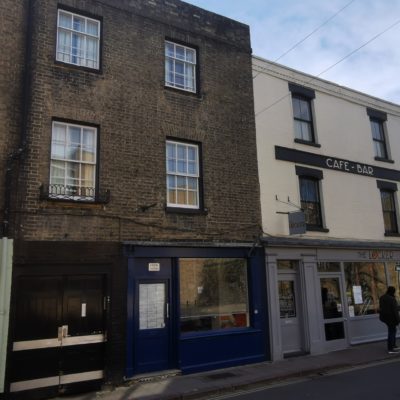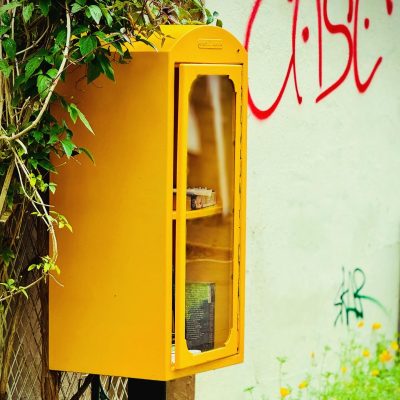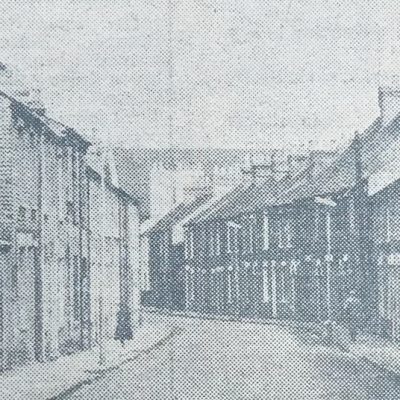Search by topic
- archaeology
- architecture
- bricklayer
- Building of Local Interest
- carpenter
- church
- crime
- dressmaker
- fire
- Great Eastern Railway
- listed building
- medieval
- oral history
- Public House
- Rattee & Kett
- Religious House
- Roman
- scholar
- school
- Then and Now
- tudor
- women
- work
- world war one
- world war two
Search by text
43 Gwydir Street
History of 43 Gwydir Street
1881
William Benstead, head, 49, coachman, b Swaffham
Sarah, wife, 44, b Suffolk
William F, son, 17, apprentice carpenter, b Cambridge
Mary A, daughter, 15, dressmaker’s apprentice, b Cambridge
Caroline, daughter, 13, scholar, b Cambridge
Charles E, son, 8, scholar, b Whittlesford
Arthur, son, 6, scholar, b Whittlesford
1891
Frederick Denston, head, 39, carpenter, b Little Downham
Amelia E, wife, 40, b Cambridge
Sarah E, daughter, 11, scholar, b Little Downham
Frederick, son, 9, scholar, b Little Downham
Martha, daughter, 7, scholar, b Cambridge
Bernard C, son, 4, scholar, b Cambridge
Arthur E, son, 2, b Cambridge
1895 CIP 15.2.1895: Inquest.—On Tuesday the Borough Coroner (Mr. H. Saunders French) held inquest at the Gwydir Arms on the body of Bertha Elizabeth Porter, aged 16 months —Sarah Porter, the wife of Charles Porter, residing at 43, Gwydir-street said the child had as a rule been healthy since birth. The child died on Sunday morning. She had had a bad cold on the Thursday evening, and witness poulticed it. On Friday and Saturday she seemed the same. Witness gave the child some cough mixture. The child seemed easier on Saturday night, and she went to bed between twelve and one. About 5.20, when she woke, she found the child dead. It’s face was not covered up. She sent one of her sons for Dr. Wood;— Mr. Edwin Stanley Wood, surgeon, practising on Mill-road said at 6.30 on Sunday morning he was called to the deceased, and found it dead. She said that she had taken the child to a chemist, who prescribed for it, and she had had no medical advice. She asked witness for a certificate, which he said he could not possibly give her. He had made post-mortem examination, and found marks of external violence. It was a well nourished child Both lungs were highly inflamed, and the child might have had a chance if properly attended to first.— ln answer to the Coroner’s question whether the evidence of the mother was consistent with what he saw, he said it was, but that the mother should have, instead of going to a chemist, gone to a doctor —The Coroner, in summing up. said if the mothers of that part of the town would only seek medical advice more often it would save great expense to the town.—The jury returned a verdict in accordance with the medical evidence.
1901
George A Manning, 44, paper hanger, b Cambridge
Eliza, 54, b Cambridge
1907
CIP 18.10.1907: Cambridge Shoemaker and a parish apprentice: Mr. J Congreve applied on behalf of the Guardians of the Poor for the Holborn Union for the cancellation of an apprenticeship agreement made on January 17th, 1906, between the Guardians and Arthur Henry Whale, boot and shoemaker, of 43, Gwydir-street, Cambridge. The Guardians alleged that the defendant had failed to perform his contract of apprenticeship, and claimed the sum of £8 8s., being arrears of wages which should have been paid under the indenture of apprenticeship.
Mr. Congreve said that lad named Albert Lee was apprenticed by the Holborn Board to defendant on January 17,1906, for three years, to learn the business of boot and shoemaker. At that time the defendant had a shop at the corner of Belmont-place and King-street, and was apparently in a good position, but he had recently removed to Gwydir-street, where he only carried on the business of repairing in a back room, and he had not taught the boy his trade nor paid his wages, or found his clothing, as he ought to have done.
The lad, Albert Lee, produced the agreement, in which, for a premium of £5, defendant undertook to teach the boy the trade of a boot and shoemaker, and pay him wage of 2s. 6d a week for the first year, 5s. week for the second year, and 7s. 6d. week for the third year, in addition to providing him with board, lodging and clothing. He said he came down to Cambridge for a month on trial, having been at the boot and shoe business for about year in the Board of Guardians schools. Defendant had never taught him boot making, nor had he seen any boots made while he had been with the defendant. He was put on small jobs, such as piecing and heeling, the remainder of his time being spent in fetching and taking out boots and running errands. When witness first came to Cambridge ho was provided by the Guardians with two suits of clothes, and all defendant had supplied him with since was a pair of trousers about six months ago, a coat and waistcoat about a week back, and a pair of boots. Witness had himself purchased clothing out of his own money. On August 10 one of the Holborn Relieving Officers came down to see the defendant, and, on the wages due to witness being reckoned up, it was found that they amounted to £9 16s. He was paid his full wages the first week, but never since. Up till six months back he received only sixpence a week, and since then he had had a shilling. Afterwards defendant promised to put some money in the bank for him, and did place £3 to his account. There was now £8 8s. due him for arrears of wages. In answer to the defendant, the latter admitted that he had seen boots remade and re-bottomed, and had seen heels built up. He had himself built up heels, and done soling and heeling and stitching.
George Pepper, assistant clerk to the Holborn Board of Guardians, stated that on September 16th he came down to Cambridge and saw the defendant, in consequence of a letter received from the boy, complaining that he was not receiving his proper wages, and was not happy and comfortable. Witness asked the defendant why he had not paid the boy his wages, and defendant admitted that he had not done so, but said he could give no reason for it. He stated, however, that his work had fallen off very much of late, and he was up in his shop in King-street in consequence, and was removing to Gwydir-street. Witness pointed out that he owed the lad considerably over £9 in wages, and defendant said he had placed £2 to his account in the bank, and would add another £1 to that. Defendant had the boy on trial for about five weeks before the indentures were signed, and no complaint was received from him until the boy wrote complaining about the non-receipt of his wages.
Defendant stated that the boy went on well when he was first sent down, although he could not do much, and witness paid him 2s. 6d on the first Saturday after the indentures were ‘ signed, but after that he did very little work, so witness reduced his wages. There was very little change in him after that, although witness frequently told him it would be for his own benefit if he would try a little more. As to his clothes, the boy very soon ’’did for” the two suits which he had when came to Cambridge, and he kicked his boots out very badly.
The Bench were agreed that sufficient attempt had not been made to carry out the indentures, and they decided to cancel them, and to make an order for the payment of the arrears of wages and the costs, amounting to £1.
Mr. Congreve then applied under another section that a fine be inflicted on the defendant for not carrying out his covenant, and a fine of 12s., including costs, was imposed. An offer of the defendant to pay the whole sum in monthly instalments of 15s. was accepted.
1911
William Cundell, 67, wood dealer, b Cottenham
Richard Barham, son in law, 22, wood dealer, b Hoveton [?]
Mrs Richard Barham, 21,b Cottenham
Lelis Barham, son, 1, b Cambridge
1913
William Cundle, woodman
1962
Leslie Asplen
1970
Leslie Asplen
Contribute
Do you have any information about the people or places in this article? If so, then please let us know using the Contact page or by emailing capturingcambridge@
License
This work is licensed under CC BY-NC-SA 4.0











